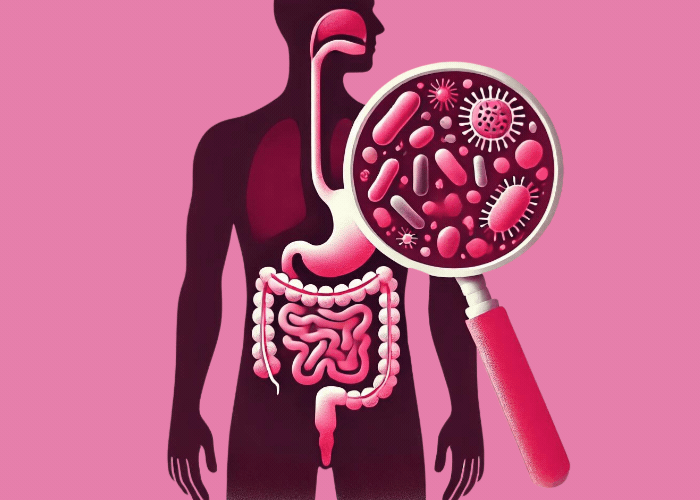
Univ.-Doz. DDr. Barbara Prüller-Strasser*
Anita Frauwallner: The gut’s importance goes much further than just digestion. You as a scientist with a focus on nutrition, have a lot to do with the big names in sport. What do you think, is the gut of importance for a performance athlete?
Barbara Prüller-Strasser: It has been long proven that the gut is closely connected with the immune system. A weakened gut also means an impaired immune function. This in turn, can have a negative effect on the performance capacity of athletes. The same can be observed the other way around, athletes with a dampened immune system (say after a long, tough training session) also display disorders of the gastrointestinal tract.
Anita Frauwallner: I often hear from athletes, even from people who only exercise for recreational purposes, that they suffer from gastrointestinal problems. Often these people don’t realise that they are having problems anymore because all their colleagues suffer from similar symptoms. These may include nausea during long training sessions or diarrhoea before, during and after competitions. Have you observed similar constellations in your examinations?
Barbara Prüller-Strasser: Absolutely. Athletic performance always means a higher turnover of oxygen and nutrients as well as a sharp increase of blood circulation in the encumbered muscles. During physical exercise, other organs such as the organs of the gastrointestinal tract, are deprived of blood due to the muscles increased needs. Especially if the body becomes dehydrated (a water shortage in the body) due to endurance training, the insufficient blood perfusion of the gut can have a negative effect on digestion and the absorption of nutrients. Subsequently this can cause stomach and gut complaints. Roughly 30 to 50% of endurance athletes suffer from gastrointestinal troubles which in turn may cause a limitation of performance capability. This can be very problematic, say if a long-distance runner already began having gastrointestinal problems after 20 miles, that would represent a severe limitation of performance. They all try to find a means to minimise this risk, in order to stay efficient from beginning to end.
Anita Frauwallner: Are you saying that we all only have so much energy, as our gut bacteria can produce? But above all: do you think that thin people have different bacteria in their gut than overweight people?
Barbara Prüller-Strasser: Interactions between microorganisms and their higher metabolism in the gut, fulfil an important role in the regulation of the body’s energy homeostasis (an equalised energy balance). This means the body only receives as much energy, as it will later need. By exploiting this mechanism, probiotics may be a future therapy option for obesity. In our study we were able to show that performance athletes who took a daily dose of a probiotic for 12 weeks (specially developed for people under continued high physical strain), showed an increased metabolic rate. Athletes taking the placebo on the hand, did not. This effect was not caused by changes in body weight or body cell mass. This means it could be attributed to an increased metabolic rate of the organism, induced by the aforementioned bacteria.
Anita Frauwallner: Could you explain to our readers which connections there are between the gut and our body’s energy balance? How should one understand the term “energy coming from the belly”?
Barbara Prüller-Strasser: Convincing indications have begun surfacing that the composition of useful bacteria in the gut, plays an important role in body composition. New research findings emphasise the potential of the intestinal microbiota (the “good” bacteria colonising the gut), to influence body weight.
“If the gut is weakened, so is the body’s immune function”
Anita Frauwallner: Those are of course exceptionally interesting findings. They excite me personally, as perhaps one day your work will contribute to helping people caught in a hopeless fight with their obesity. In your study with the performance athletes you also showed that during the intake of the special probiotic, a significantly reduced number of upper respiratory tract infections were documented, compared to the placebo group. What exactly do our gut bacteria have to do with our breathing organs? Do they influence the occurrence of bronchitis, coughing or a sore throat?
Barbara Prüller-Strasser: Especially intensive physical strain is associated with reduced immune function: The number of immunoglobulins and the function of phagocytes (our scavenger cells), are reduced. This in turn reduces the body’s capability to destroy pathogenic germs and so raises the susceptibility to infections. Additionally, the permeability of the gastrointestinal epithelium increases. This means that the intestinal mucosa becomes more “porous”, which makes it easier for pathogens to enter the body via the gut. These factors contribute to athletes being more susceptible to viral infections of the upper respiratory tract during this so called “open window phase”, which reaches its peak roughly 6 hours after intensive physical strain. During the study period only 35% of the subjects treated with the probiotic came down with a cold, compared to 90% in the placebo group. The proportion of athletes who suffered a respiratory infection which lasted for one week or longer, was 250% higher in the placebo group than in the probiotic group.

Anita Frauwallner: Those are unbelievable results, and they may be able to help a lot of people who enjoy being active. I think it will interest many of our readers that we can influence our immune system via our gut and its bacterial flora. But back to your performance athletes: One often reads that tryptophan is especially important for athletes. What is tryptophan and what effect does it have on the body?
Barbara Prüller-Strasser: Tryptophan is an essential amino acid which is required for the assembly of proteins. Essential amino acids cannot be produced by our bodies and therefore must be obtained from our diet. Tryptophan is also the substrate for the “happiness hormone” serotonin, which also plays a central role in immune responses, mediated by either the innate or obtained immune system. The tryptophan degradation that occurs during these immune reactions is an important defence mechanism. Denying tryptophan to specific cells, reduces the affected cells’ protein synthesis, which can mean that pathogens residing inside those cells can no longer multiply. The same can be said for malicious cells. This is why tryptophan is broken down during intensive physical strain. If too much tryptophan is broken down this can lead to a reduced serotonin synthesis in the brain. This in turn may lead to impaired memory function and a predisposition for depression.
Anita Frauwallner: Is it true that an increased tryptophan breakdown is accompanied by inflammation of the intestinal mucosa? How could this be tied to the fact that athletes often suffer from frequent muscle injuries despite, or because of their increased physical activity?
Barbara Prüller-Strasser: As tryptophan is important for the multiplication of healthy (=normal) cells, a sufficient availability of tryptophan is also necessary for the repair of injured tissues.
Anita Frauwallner: You recently investigated what effects the intake of OMNi-BiOTiC® POWER has on the tryptophan levels of performance athletes. What were the results of your research?
Barbara Prüller-Strasser: The goal of this study was to measure the influence probiotic gut bacteria have on biomarkers of immune activation in athletes. This was determined after the trained athletes completed intensive endurance training. In this double blind intervention study, 33 well trained athletes were closely monitored. Over the course of twelve weeks the participants either took a daily dose of the probiotic or a placebo. After twelve weeks under influence of the probiotic, the intervention group showed a significantly reduced tryptophan degradation rate after standardised continuous physical strain. The higher tryptophan levels after the physical strain could indicate reduced immune activation in the probiotic group.
Anita Frauwallner: These are highly exciting results, especially for athletes. For many, it may represent a totally new approach. In your opinion, are there other effects which probiotics have on performance athletes?
Barbara Prüller-Strasser: It could be shown that probiotic food supplements significantly reduce the incidence, severity and duration of infections of the upper respiratory- and the gastrointestinal tract. Furthermore, one could observe that probiotics improve the barrier function of the gut mucosa. In this way the gut’s permeability for pathogenic germs can be reduced. There are also indications that probiotic supplementation can improve gut and immune function. This occurs through interaction with M cells (play an important role in development and functionality of the immune system and reside within the gut), intestinal epithelial cells and dendritic cells.
Probiotics significantly reduce the frequency, severity and duration of infections of both the upper airways and the gastrointestinal tract.
Anita Frauwallner: I assume that, after such major successes, you will continue your research. Also with OMNi-BiOTiC®. Which results do you expect from future studies?
Barbara Prüller-Strasser: The results of future studies should emphasise the efficacy of probiotics and their benefits for athletes. These would be associated with a series of positive effects on gut health, as well as modulations of immune function. But also the therapeutic effects of probiotics in the therapy of depression-like behaviour and reinforcement of stress resilience will be clinically studied in the coming years and may lead to new therapy approaches to stress caused immune dysfunction. Future studies should therefore clarify open questions, such as the effect of different types of stress and the optimal duration for interventions. As well as different mechanisms of action regarding clinical and exercise-physiological findings. Other studies will also research the importance of physical activity for the gut-brain-axis, with and without probiotic supplementation.
*Univ.-Doz. DDr. Barbara Prüller-Strasser is a researcher in the areas of prevention, nutrition and health at the Medical University of Innsbruck (Biocenter). The researcher intensively occupies herself with issues such as healthy aging, nutritional medicine, performance physiology and sports nutrition. Furthermore, she individually supports top athletes and various national teams. She is also the scientific director of the annual international symposium on sports nutrition “Sporternährung” in Vienna.



























